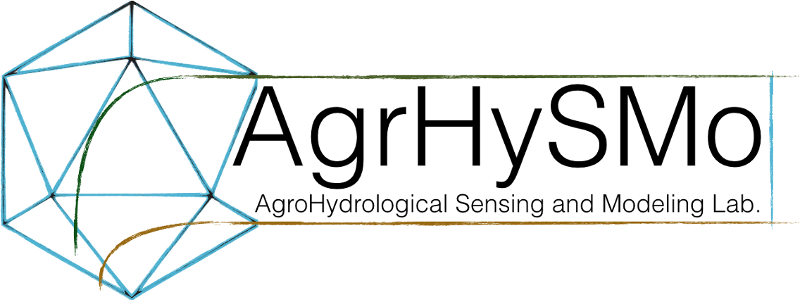The activity intends to present new insights on the topic of water management in sparse crop systems by implementing approaches such as the so-called feed-forward and feedback control. The first refers to the use of agrohydrological models to estimate crop water requirements and schedule irrigation. Meanwhile, the feedback control is based on the use of sensors to monitor diverse soil-plant water status variables to set the irrigation timing and water amount, according to reference values (i.e. thresholds) accurately defined. In addition, the feedback approach could serve as a support tool for a feed-forward irrigation control by implementing the monitored data into the soil water balance model.
I n collaboration with an international research group coordinated by Professors Luis Santos Pereira (University of Lisboa), AgrHySMo is reviewing studies performed in the last decades on crop coefficients for woody perennial crops. This collaboration aims to upgrade the crop coefficient listed in tables 12 (single crop coefficient, Kc) and 17 (basal crop coefficient, Kcb) of the FAO 56 paper (Allen et al., 1998).
n collaboration with an international research group coordinated by Professors Luis Santos Pereira (University of Lisboa), AgrHySMo is reviewing studies performed in the last decades on crop coefficients for woody perennial crops. This collaboration aims to upgrade the crop coefficient listed in tables 12 (single crop coefficient, Kc) and 17 (basal crop coefficient, Kcb) of the FAO 56 paper (Allen et al., 1998).
In this context, we developed a new conceptualization of the crop coefficient, named eustress crop coefficient. In particular, to quantify this coefficient, our method applies the inverse modeling approach (Paleari et al., 2017). This allows developing in-silico ideo-factors that can be used a priori to adjust the crop coefficient, on which farmers should focus to develop profitable irrigation water saving. Furthermore, these factors define the Ks eustress, which characterizes a specific crop, in a specific environment, and under a specific water-saving strategy. As a result, the agrohydrological models are able to adjust the crop coefficient for the eustress factors, once the target of the irrigation water-saving strategy is known (magnitude of the eustressor to be applied and its distribution within the growth cycle). The eustress-adjusting coefficient, Ks eustress, will adjust the crop coefficients (Kc or Kcb), which are proposed in FAO56 for the estimation of the crop water requirements. Consequently, Kc or Kcb will consider the effect of the water deficit needed to reach a prefixed beneficial target (i.e. the amount of °Brix, bioactive substance, water use efficiency).
Deliverable
- Àngela Puig-Sirera, Daniele Antichi, Dylan Warren Raffa and Giovanni Rallo. 2021. Application of Remote Sensing Techniques to Discriminate the Effect of Different Soil Management Treatments over Rainfed Vineyards in Chianti Terroir. Remote Sens. 2021, 13(4), 716.
- Puig-Sirera, Àngela, Giovanni Rallo, Paula Paredes, Teresa A. Paço, Mario Minacapilli, Giuseppe Provenzano, and Luis S. Pereira 2021. Transpiration and Water Use of an Irrigated Traditional Olive Grove with Sap-Flow Observations and the FAO56 Dual Crop Coefficient Approach. Water 13, no. 18: 2466.
- G.Rallo, T.A.Paço, P.Paredes, À.Puig-Sirera, R.Massai, G.Provenzano, L.S.Pereira. 2021. Review. Updated single and dual crop coefficients for tree and vine fruit crops. Agricultural Water Management. Volume 250, 1 May 2021, 106645.
- Àngela Puig-Sirera, Giuseppe Provenzano, Pablo González-Altozano, Diego S. Intrigliolo, Giovanni Rallo. 2021. Irrigation water saving strategies in Citrus orchards: Analysis of the combined effects of timing and severity of soil water deficit. Agricultural Water Management. Volume 2481 April 2021 Article number 106773.
